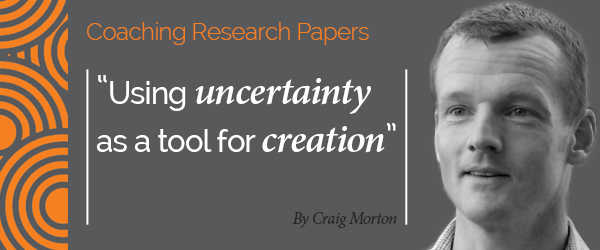Research Paper By Craig Morton
(Personal Change and Development Coach, CANADA)
Coaching poses an interesting duality. On the one hand, the role of the coach is to help the client become more certain about moving forward with action. Yet, what has often brought a client to a coaching relationship is a great deal of uncertainty on how to proceed in one or several areas in their lives. Therefore, it is vital for a coach to not only help a client get from point A to B, but to also be aware of what has caused (and currently causes) uncertainty in their clients’ lives. This awareness of their “uncertainty triggers” can then be used for creating a deeper awareness of actions in their lives but also a very powerful tool for profound and sustainable action rather than frozen inaction. The idea of uncertainty alone provokes implications of the unknown, a changing present reality, and, in some cases, weakness. We look to leaders to provide certainty, jobs to provide an unchanging sense of security, and large endeavors to be forever (marriage, where we live, etc). However, to quote an overused yet accurate cliche “the only thing that is certain is change itself”.
So if change is inevitable and if with it comes uncertainty, why is it not embraced? Why do we work so hard to try and keep things the same and ourselves away from the experience of uncertainty?
1. Uncertainty is uncomfortable
Often clients, despite being unhappy in their current situations and being in a state of inaction, feel justified in their realities because at the very least, their status is predictable (Fields, 2010). Clients may not like their surroundings, but they are familiar with the situation and the emotions that are evoked. Taking steps to change them will create a temporary disruption, change of routine, and touch emotions that may be unexpected. As well, the question that often looms is “I know I’m unhappy now, but what if I’m even more unhappy after?” It is the classic argument in one’s head between “the devil they do know vs. the one they don’t”.
When clients feel these feelings caused by uncertainty like fear, anxiousness, panic, and impending doom, they run the other way and try and create some sense of certainty. For example, in a case study done in the book Uncertainty: Turning fuel and doubt into fuel for brilliance, Jonathan Fields (2010) outlines a client call that highlights this very reaction of trying to quickly extinguish uncertainty for a perceived safer and more certain path:
“I feel amazing,” said the voice at the other end of the phone.
“It’s like that tightness in my stomach is gone. I can breathe again. And I slept like a baby for the first time in months.”
“Really?” I replied. “What gives?”
“Well . . . I’ve decided to pull the plug on the business, and the moment I did, everything got better. I wasn’t anxious anymore, I felt like a weight had been lifted. Like after struggling and working like crazy for months, I finally got my peace of mind, my life back. I feel totally free again. Unencumbered.”
The voice belonged to a client, Anne. It was a call I’d taken before from many people and in many different variations. After six months of planning, hundreds of hours of preparation, site building, design, asset creation, product development, copywriting, casting, filming, editing, system testing, and marketing prep, she’d launched a new business. The plan was to grow it aggressively over the following two years until it was successful enough to support her.
“So,” I asked, “do you trust me?” “Implicitly.”
“Why?”
Because I’m about to ask you something that’s going to make you angry at me. And very likely kill your ‘free as a bird’ buzz. I need to know whether walking away from this venture was genuinely a good call or whether it was born out of your inability to handle the uncertainty, the exposure, and the risk that rides along with the birthing of any deeply meaningful creative endeavor. Put another way, we need to figure out whether you’re confusing genuine peace of mind with the passing lack of angst that follows the demise of a dream but precedes a mounting wave of regret.
“Oh.”
“I want you to close your eyes and visualize something. Imagine, just for the moment, that you didn’t make the call to shut down the business. Yeah, I know, you’ve made your decision. You feel really good about it. Just humor me. Now, place yourself forward in time. It’s two years from today. Everything you dreamed of making happen in your business has happened. You’ve succeeded beyond your wildest imagination. Every goal has been met, every team formed, every product and service launched and embraced, a vibrant culture grown.
